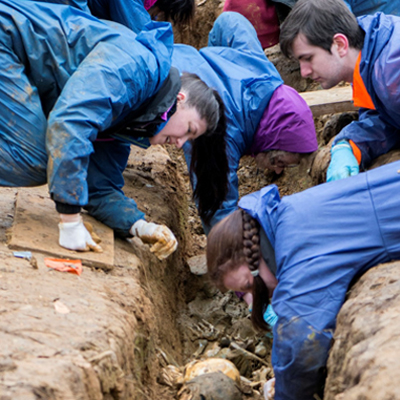Contact Roland Wessling
- Tel: 01234 383064
- Email: r.wessling@cranfield.ac.uk
- ORCID
Background
Roland Wessling studied physics and astronomy in the early 1990s after completing his officer's training in the German Military Police Force. He then moved on to archaeology, law and soil science at the University of Hamburg, Germany, before moving to Sheffield University, UK, graduating in archaeological sciences in 1998. He then completed his university education with a MSc in forensic archaeology at Bournemouth University, UK. Since then, he has been working as a freelance forensic archaeologist on international atrocity crime investigations in Bosnia, Croatia, Iraq, Cyprus and France as well as working on domestic crime cases in the UK and Germany. Roland regularly participates in delivering short courses in the USA and has done similar projects in Colombia. Most recently, Roland was one of the two Senior Archaeologists of the team that excavated 250 British and Australian Soldiers from WWI in Fromelles, France. For more information, please visit the Commonwealth War Graves Commission website (more information on the project).
Roland is also Director of Operations of the CRICC (Cranfield Recovery & Identification of Conflict Casualties) Team.
For a long time, Roland has promoted the importance of forensic radiography in the context of forensic archaeological and anthropological investigations and has recently been made an honorary associate member of IAFR (International Association of Forensic Radiographers).
Research opportunities
Roland's main research interests focuses on the automated, quantitative analysis of virtual skeletal remains.
Since a tragic accident in 2011, in which Roland lost his partner Hazel Woodhams through carbon monoxide (CO) poisoning and which left him with lasting injuries, Roland focuses on raising both awareness and funding for research into this topic. So far, he has raised over £300,000 and is running two high profile CO + research projects. Roland also acted as one of four scientific advisers for Baroness Finley for her third report into CO and heads the new CO+ Science & Technology group of the 'All Fuels Action Forum on CO'. His aim is to reduce the number of CO poisoning victims through both campaigning and research.
Current activities
'Conservation of Memories of the Genocide' project in Rwanda
Delivery of training and exercising in disaster victim identification for UK police forces
Book and article peer reviews
Work on industry standards in forensic archaeology on a European level as well as in the USA
Development of a completely new method of Virtual Skeletal Analysis (ViSA)
Project Coordinator in various Carbon Monoxide (CO) Poisoning Research Projects
Founder and Chairman of the CO+ Science & Technology group (part of the All Fuels Action Forum on CO)
Presentation of various talks and posters at the annual American Academy of Forensic Science conference
Clients
United Nations (ICTY, ICC)
UK Foreign & Commonwealth Office
UK and German Police Forces
Commonwealth War Graves Commission (CWGC)
Oxford Archaeology
Gas Safety Trust
House of Lords
Publications
Articles In Journals
- Brock F, Southwell R, Hazell Z, Wessling R, Green M, .... (2024). Using high-resolution digital photography and micro-CT scanning to investigate Deathwatch Beetle damage to an historic timber from HMS Victory. Environmental Archaeology, 29(1)
- Wessling R & Spoletini A. (2024). Are two bodies in a trench a mass grave? an attempt to bridge the gap between single and mass graves. Forensic Archaeology, Anthropology and Ecology, 1(1)
- NYOMBI A, Williams M & Wessling R. (2023). An Overview of Solid Fuel Processing, Kinetics, and the Advances in Minimizing Carbon Monoxide Emissions.
- Schotsmans EMJ, Wessling R, McClue WA, Wilson AS, Edwards HGM, .... (2020). Histology and Raman spectroscopy of limed human remains from the Rwandan Genocide. Journal of Forensic and Legal Medicine, 70
- Nyombi A, Williams M & Wessling R. (2019). Reactivity and free radical chemistry of lilac (Syringa vulgaris) charcoal. Energy & Fuels, 33(2)
- Nyombi A, Williams M & Wessling R. (2019). Toxic emissions from smouldering combustion of woody biomass and derived char with a case study of CO build-up in an ISO container. Energy Sources, Part A: Recovery, Utilization, and Environmental Effects, 42(24)
- Márquez-Grant N, Wessling R, Öfele A & Moore V. (2019). Searching for the missing soldier: identifying casualties from the First World War. Metode Science Studies Journal, 2020(10)
- Nyombi A, Williams M & Wessling R. (2019). Catalytic effects on the nonisothermal oxidation of solid fuels by oxygen: an experimental study. Energy & Fuels, 33(10)
- Nyombi A, Williams M & Wessling R. (2019). Mechanical impregnation of Pd-Sn/alumina and Cu-Mn/graphite on charcoal to minimise carbon monoxide emissions. Chemical Physics Letters, 715
- Nyombi A, Williams M & Wessling R. (2018). Determination of kinetic parameters and thermodynamic properties for ash (Fraxinus) wood sawdust slow pyrolysis by thermogravimetric analysis. Energy Sources, Part A: Recovery, Utilization, and Environmental Effects, 40(22)
- Klinkner M & Wessling R. (2013). The challenges for capacity building and subsequent impact assessment: The case of mass grave investigation training by Inforce at Bournemouth University. Science & Justice, 53(4)
Books
- Wessling R. (2018). The Influence of Operational Workflow and Mortuary Environment on Identification In Latham K, Bartelink E & Finnegan M (eds), New Perspectives in Forensic Human Skeletal Identification. Elsevier.
- Wessling R. (2018). Chapter 28 The Influence of Operational Workflow and Mortuary Environment on Identification A Case Study From the WWI Battle of Fromelles In New Perspectives in Forensic Human Skeletal Identification. Elsevier.
- Wessling R. (2015). The Inforce Foundation In Groen WJM, Márquez-Grant N & Janaway R (eds), Forensic Archaeology: A Global Perspective. Wiley.
- Wessling R. (2014). The Inforce Foundation In Forensic Archaeology A Global Perspective. Wiley.
- Cox M, Flavel A, Hanson I, Laver J & Wessling RR. (2007). The Scientific Investigation of Mass Graves: towards protocols and standard operating procedures

